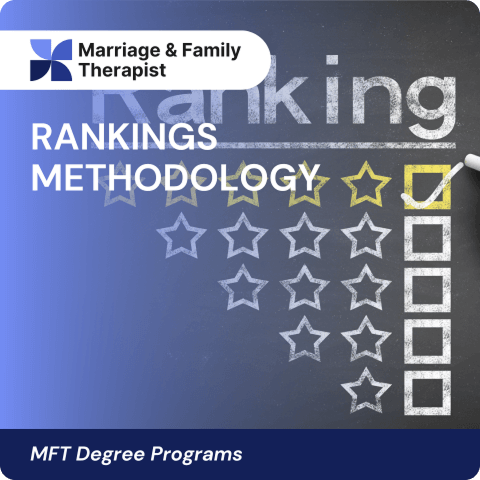Rankings Methodology
MarriageFamilyTherapist.org is committed to providing accurate, insightful, and well-researched rankings to help you find the best marriage and family therapy programs. We understand that selecting the right program is a highly personal decision—your ideal school depends on factors such as career goals, financial considerations, and educational preferences.
To aid in your decision-making process, we evaluate and rank marriage and family therapy programs using a comprehensive methodology that prioritizes program quality, value, and accessibility.

Our Ranking Process
Our rankings are based on a thorough evaluation of key factors to ensure that the information we provide is both relevant and reliable. We gather data from multiple sources, including publicly available records and institutional submissions, to build a complete picture of each program.
Program Exclusions
Before ranking programs, we compile a database of available options and exclude those that:
- Lack enrollment data in the Integrated Postsecondary Education Data System (IPEDS).
- Are no longer operational or are scheduled to close during the data collection period.
By applying these filters, we ensure that our rankings reflect only active, verifiable, and high-quality programs.
Evaluation Criteria
We use a structured points-based system to rank marriage and family therapy programs based on the following key factors:
1. Acceptance and Completion Rates
We assess how selective a program is and whether students will likely complete their degree successfully. Programs with higher completion rates indicate strong student support and academic success.
2. Program Cost
Tuition and fees are evaluated in relation to the local cost of living to determine affordability and overall value for students.
3. Accreditation Status
Accreditation is crucial in ensuring a program meets high educational and professional standards. We prioritize programs accredited by recognized bodies, such as the Commission on Accreditation for Marriage and Family Therapy Education (COAMFTE).
4. Reputation and Competitiveness
We consider the overall standing of the institution within the field of marriage and family therapy, taking into account peer reviews, employer perceptions, and student satisfaction.
5. Program Specializations
Programs that offer specialized MFT tracks receive additional consideration, as they provide students with tailored career pathways.
6. Student-to-Faculty Ratio
Smaller class sizes and lower student-to-faculty ratios allow for more personalized instruction and mentoring, which enhances the learning experience.
After verifying eligible programs, we assign points based on these factors and rank them from highest to lowest.
Reliable Data Sources
To ensure our rankings are built on verified and accurate information, we collect data from trusted sources, including:
- Integrated Postsecondary Education Data System (IPEDS)
- National Center for Education Statistics (NCES)
- U.S. Department of Education’s Office of Postsecondary Education (OPE)
- The Council for Community and Economic Research
These sources provide comprehensive and up-to-date data, allowing us to create rankings that prospective students can trust when selecting a marriage and family therapy program.
Questions, Comments, or Concerns?
If you have any questions about our rankings, methodology, or specific programs, please reach out to us through our Contact Form. We value your feedback and are here to assist you in making informed decisions about your education and future career in marriage and family therapy.